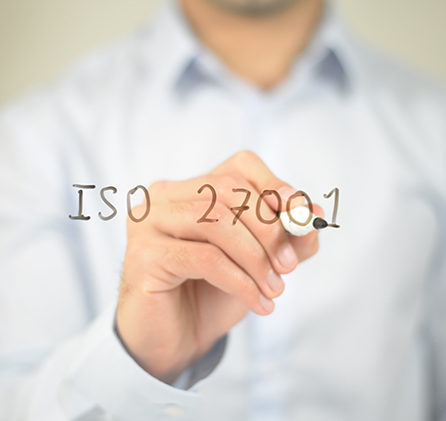ISO 27001 for education is a valuable certification for educational institutions to protect your IT infrastructure from the risk of cyber attacks. Your staff and students rely on IT infrastructure, to store personal data and to share lesson plans and course materials to communicate efficiently. Ask yourself this, could your HEI or college continue to operate if a malware attack or hack happened?
ISO 27001 is all about ensuring data security, protecting client confidentiality, and managing the availability of sensitive information within your organisation. Without it, your institution could be at risk of a serious security breach that may have long-lasting consequences. So, let’s explore this in further detail!
The consequences of cyber security breaches for educational organisations
Concerns around cyber security breaches are longstanding within the higher education sector, and we understand that this is only increasing with the emergence of new technologies such as AI.
In a 2019 experiment conducted by Jisc, a university and research centre digital services agency, security testers were able to breach the systems of 50 UK universities in under two hours, accessing the personal data of students and staff, research networks, and finance systems.
Fortunately, Jisc was not trying to steal data, they were just trying to prove a point. Dwindling budgets and limited resources mean that certain higher educational establishments are cyber-sitting ducks. This is why ISO 27001 certification is extremely beneficial for higher educational institutions. It can provide much more than just protection for your IT infrastructure, offering data security protection across all areas of your education business.
In relation to Jisc’s experiment, the head of the security operations centre at Jisc John Chapman said the experiment proved how vulnerable universities were to spear phishing – highly targeted malware emails, which are sent to senior personnel, encouraging them to click a link or download an attachment.
“We are not confident that all UK universities are equipped with adequate cyber-security knowledge, skills and investment,” said Chapman. With the increasing sophistication of these attacks, he warned of a looming disastrous data breach, saying: “Universities can’t afford to stand still in the face of this constantly evolving threat.”
Cyber security for education
Across educational institutions, the heavy reliance on IT and electronic storage of information and personal data mean that safe and secure measures that protect the security and integrity of this information are key. Cyber attacks compromise the safety and security of everybody across your educational institution. And as many students and teachers learn and work online, ensuring devices are protected is essential for keeping your business safe from harm.
As we’ve explored in the previous section, cyber attacks on educational institutions are frequent, and they can have serious consequences for your institution if measures are not deployed.
With this in mind, there are several areas to consider when highlighting cybersecurity standards in education. These may include:
- Firewall configuration – Ensuring that you have sufficient firewall protection to guard against potential hackers. This may be through software firewalls, multi-factor authentication and updating firewall firmware.
- Recording of all network devices – Ensure all your network devices are documented and any unused accounts are removed or disabled.
- Limit user access – Hackers are prone to exploiting users with the highest level of access rights. Limiting numbers and access rights to ensure the level of compromise is minimised will strengthen your information security.
ISO 27001 certification can help with information security for your educational institution, reducing the risk of it being compromised.
Updates to the ISO 27001 Standard
Changes were made ahead of the 2019/2020 academic year concerning ISO 27001 for education institutions. It was outlined in some of the contracts for the security and department policies for Conditions of Funding for Colleges and HEI, and ITP Contract for Services that;
“The college will have achieved, and be able to maintain, independent certification to ISO/IEC 27001.”
Since then, further updates have been made to the ISO 27001 Standard, with the introduction of ISO 27001:2022. Let’s look at some of the key requirements:
- Context and scope – Identify relevant requirements of interested parties and how the information security management system (ISMS) will address them.
- Planning – Making sure your information security objectives are available as documented information.
- Support – A requirement that outlines a defined ‘how to communicate’ framework.
- Operation – You are required to control ‘externally provided processes, products or services. relevant to your ISMS.
- Performance and evaluation – Measures to monitor the effectiveness of the ISMS need to be comparable and easy to reproduce.
What does ISO 27001 certification mean?
ISO 27001 certification is a confirmation of compliance. Compliance means your higher education institution has met a specific set of requirements around the systems and ISO 27001 controls you put in place to protect your organisation from cyber-attacks and other data threats, not to mention avoiding disruption, reputational damage, and incurring huge costs.
*Wondering how much ISO 27001 costs? Check our dedicated page for more information.
In fact, you probably meet most of the ISO 27001 Standard’s criteria already, as your previous contracts required you to put adequate security arrangements in place that met similar levels of best practice. Certification is just a way of formalising it.
The benefits of ISO 27001 for education
ISO 27001 certification brings with it lots of benefits that can help your educational institution combat the adverse effects of security breaches.
It covers applicable permissions and access to your IT infrastructure, vital when you consider the number of staff and students using it, and the physical security of your premises, a significant risk factor for large, sprawling campuses. Contractual obligations aside, certification is a huge plus for your establishment.
It’s the perfect opportunity to review your existing information security policies. It also shows you’re committed to ensuring the required controls are in place and being continually improved. You can also demonstrate that you’re taking precautions to protect the data you process from unlawful access, corruption, and theft.
From pupils and parents to staff and suppliers, ISO 27001 proves to everyone you take security seriously and that you’re doing everything you can to minimise risk and protect their data.
Discover more about how Citation ISO Certification can help you achieve certification for ISO 27001:2022 in our blog post here.
Gain ISO 27001 certification for education with Citation ISO Certification
It’s recommended that you approach a consultant/certification body, like Citation ISO Certification, to check whether your existing processes and procedures meet the requirements of the ISO 27001 Standard.
With Citation ISO Certification, the process of certification is simple (we make sure of it). We’re an experienced ISO certification body that can assess whether your existing processes and procedures satisfy the requirements of the Standard before making any further changes and improvements.
Our expert ISO 27001 consultants work with you, making only the necessary improvements to help you meet certification standards.

